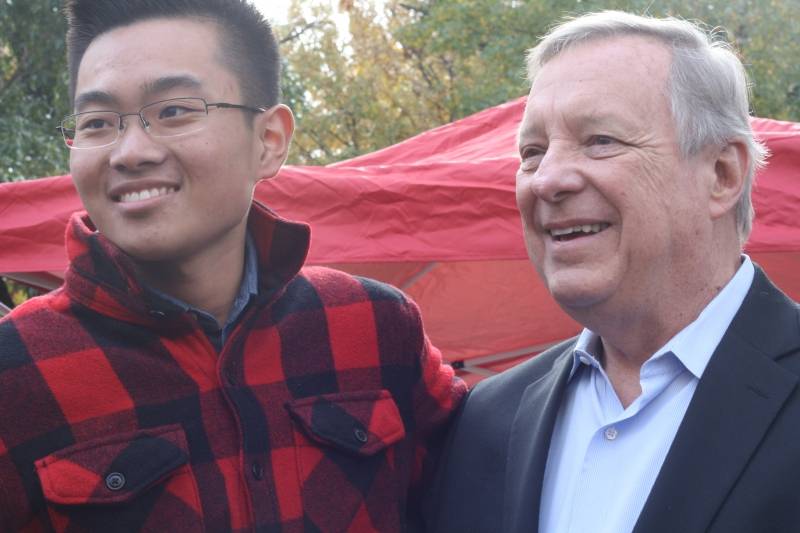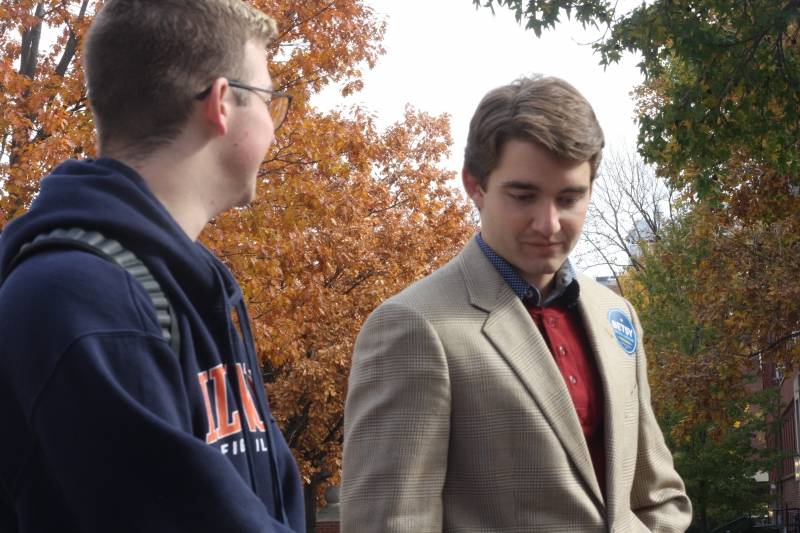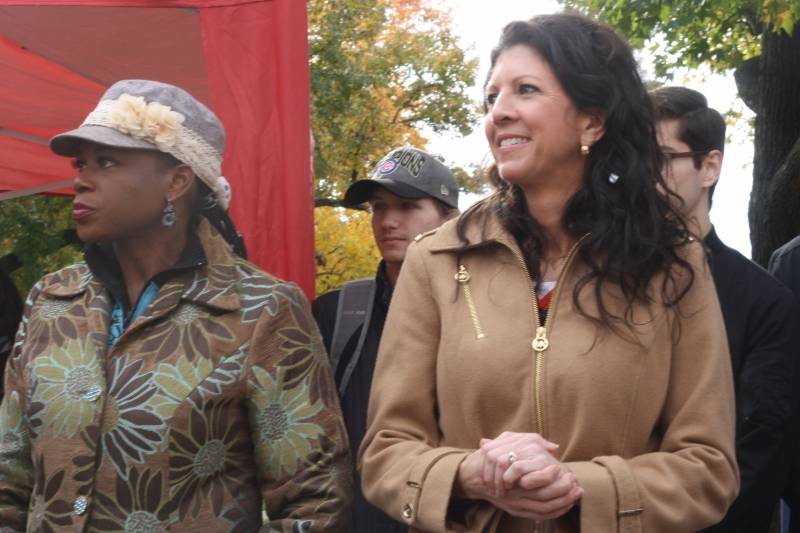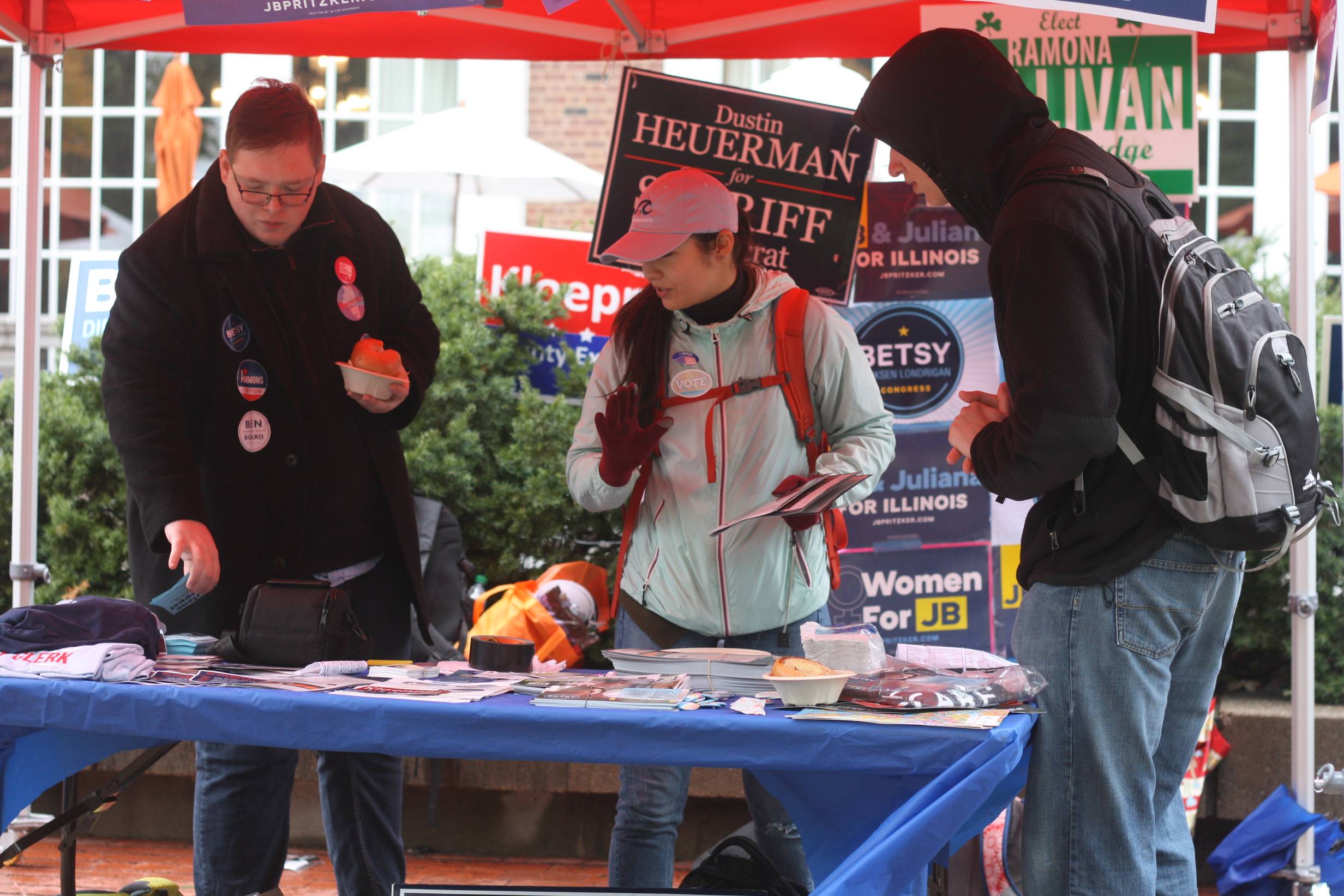The outcome of the midterm election that will be on November 6th could very well depend on turnout from two voter groups known as millennials and Generation Z, or post-millennials. College students have been much of the focus for candidates running for office this year hoping to get their vote.
Millennials aren’t always reliable when it comes to voting in elections, especially in a midterm election. In the 2014 midterm, only about 22 percent of eligible millennials (ages 18 to 29) voted in an election where the overall voter turnout was about 42 percent.

Illinois Senator Dick Durbin (D-IL) came to the University of Illinois campus on Friday to talk to students, urging them to support Betsy Londrigan who is the Democratic nominee for the Illinois 13th Congressional race. Durbin noted that millennials are approaching this election differently than other voting groups.
“They’re coming to it with their own sets of values, their own questions, their own challenges to those of us in public office and those of us running for it,” Durbin said. “That’s a refreshing thing, if they were apathetic, lethargic or couldn’t care less we would be depressed over it. I think they are really engaged to be part of this process.”
Durbin believes that the reason for the surge and enthusiasm in younger voters has been because of President Trump and his administration’s policies.
“This is a different election because of this president, this president has challenged the basic values and principles of America and a lot of people are offended by the things he has said and done,” Durbin said. “Taking the United States out of the Paris Agreement, the only country in the world that is not working to make a cleaner planet, I mean that offends these students especially those studying the sciences. They understand that this president does not speak for them. I think you are going to see a greater participation by students since ever when it comes to this election.”

Ben Chapman, a student at the University of Illinois, will not only be voting in the midterms, but he will also be participating in it as a candidate. Chapman, 21, is running for Champaign County Board in District 1 and will be the Democratic nominee on the ballot. Chapman does agree that President Trump is a reason for the increase in enthusiasm from younger voters, but he believes there is another reason as well.
“The energy we are seeing around Betsy Dirken Londrigan’s campaign and around voting on campus isn’t due necessarily to Donald Trump himself but it’s due to a frustration with the forces that created the president that we have,” Chapman said. “That’s a poor electoral system, that’s a culture that doesn’t accept women’s rights with the importance that they have and doesn’t accept sexual assault and sexual violence with the gravity that those issues deserve.”
Two issues for Chapman that are imperative to him as a candidate for county board and as a college student are the economy and the environment.
“My fellow students are going to be entering the workforce after this and the availability of jobs is important,” Chapman said. “Another big one for me and that I see more of is the environment. Our ecosystems, that’s going to be very expensive for our generation to have to repair, and the people in office are not going to have to foot the bill for the destruction that they are causing currently. I think that’s one issue we are going to see increasingly from students caring about.”
According to the Pew Research Center, voter enthusiasm is the highest it has been for an election in the past two decades with 72 percent of voters that said that the issue of which party that controls Congress is a major factor.
James Kosmopoulos, a student at the University of Illinois, already cast his ballot by mail in October, marking the first time he has voted in an election.
“I supported a lot of Democrats,” Kosmopoulos said. “I was very excited to vote for my favorite votes which I cast for Betsy Dirksen Londrigan, Aaron Ammons, and Ramona Sullivan.”
An issue that was a deciding factor for Kosmopoulos as a college student to vote Democrat was education, specifically on the problem of high college tuition.
“With less access to financial aid that people are having including myself, it makes things really difficult and I feel that nobody should have to worry to go to college when they are expected to go there in the first place in order to succeed in the world that we are in,” Kosmopoulos said. “I think that’s insane how expensive tuition is so that’s why I support Betsy too. She wants to ensure that college is a lot more affordable and that people have more access to other secondary options besides college.”
Another issue that played a part in the decision to vote Democrat for Kosmopoulos was the issue of healthcare. Kosmopoulos believes that it healthcare should be a right and that all citizens should have access to it.
“With people like my grandmother who relies on Medicaid and also social security to get by which isn’t technically health care, but when you just see Republicans gutting those, underfunding them, it just enrages me,” Kosmopoulos said. “People like my grandmother who work their whole life and a single mother are the last person who should have to worry about that. Healthcare is probably the most important thing to me.”
Kosmopoulos believes that there will be a higher turnout especially from younger voters such as himself, but that it will be difficult.
“I feel that the institutions that we are in definitely do not want young people to vote so it’s very difficult to get the word out and to put in any effort to make sure young people vote and make it as easy as possible,” Kosmopoulos said. “Everybody should be able to vote easily. I do think there will be a higher turnout but it definitely will not be easy.”
Aya Bridgeland, a senior at the University of Illinois, will be voting for the first time in the midterm election. Bridgeland said she has been paying close attention to both the state and local races. Bridgeland supports the Democratic nominee for Illinois governor, JB Pritzker, who is up against the Republican nominee, Bruce Rauner.
“The three races I am most concerned about are the race for governor, the representative for our district and for county clerk,” Bridgeland said. “Obviously a lot of governorships are Republican right now. I think it would be great if we could flip one at home here.”

Bridgeland is also keeping an eye out for the Illinois 13th Congressional race where Dirksen, the Democratic nominee, is up against Republican incumbent Rodney Davis. Bridgeland is hoping that Londrigan wins on Tuesday.
“Rodney Davis is such a typical Republican with no real defining characteristics, I feel like in the House people vote as a monolith, there is no real way to distinguish yourself within your party in the House as an outside vote,” Bridgeland said. “Just by virtue of voting out a Republican and voting in a Democrat, I am really excited about this race. I hope Betsy wins.”
Bridgeland sees two parties within younger people, one that is excited to vote in the midterms and one that feels hopeless about the political process.
“There are people who are really jazzed about voting and are really energized, people like me,” Bridgeland said. “I also see people who think it’s really hopeless and they think that their vote doesn’t really matter. Obviously, I don’t think that, but I do see a lot of disillusionment in other young people.”
Bridgeland would agree with the sentiment that the boost in enthusiasm from younger voters has been due to the Trump administration.
“I see a lot of people who before the 2016 election considered themselves more moderate, now are going out and voting for more Democrat candidates,” Bridgeland said. “I think younger people are shifting in retaliation against the president and kind of the wrong way they see the country going. That’s just my opinion though in what I see myself and my friends.”
Juan-Carlos, a junior student at the University of Illinois, will be voting for all of the Democratic candidates in the midterm election. Two issues for Juan-Carlos that important for him are climate change and immigration
“Climate change is not talked about enough let alone even just acknowledged as a real thing that is going on,” Juan-Carlos said. “Immigration is another. Specifically on how we are like completely denying people to enter the country.”
Valeria Vargas, a senior majoring in psychology at the University of Illinois, will also be voting in the midterm election, but feel that a lot of the times candidates make promises that cannot be kept.
“A lot of candidates say that they want more jobs, better healthcare, housing, but sometimes it’s kind of just blank promises,” Vargas said. “How’s the money allocated and stuff like that? I think that would be a little more of an issue I am concerned of is transparency, where is the money going and to what organizations.”
Vargas said that she and a group of students were motivated when former President Barack Obama came to speak at the University of Illinois back in September. Vargas believed that President Obama’s call to action to students made a big impact on those who saw it.
“Obama said that a lot of millennials were the ones who need to vote,” Vargas said. “I feel like right now it’s kind of our generation taking on the roles for a lot of things. We complain about having to wait until the presidential election to vote, but the midterms and local elections matter the most too because they are the ones directly affecting us.”
Drew Corbin, a junior at the University of Illinois, will be another voter in the midterms Corbin majors in political science and that he enjoyed learning about history particularly political history and government.
“I’ve been that person that sees that change happens through politics, through government,” Corbin said. “Through people making those changes. I’m kind of the person that instead of saying well that’s just the way it is, I’m like instead of how about doing your part to change it. That’s why I do this.”
Corbin stated he will be voting for Democrats that will be on the ballot though he wasn’t always on the Democrat side when it came to the political spectrum.
“It wasn’t until the last few years that I decided to become more farther left,” Corbin said. “Things like education and healthcare have definitely shifted in my policy. Also with the stuff that has recently has happened with the Republican Party and conservative politics in general, I have not been a fan of.”
Matthew Mota, a student at the University of Illinois majoring in civil engineering, said that he will be voting for the first time in a midterm election. Mota is a Libertarian and will be voting for candidates such as Kash Jackson for governor of Illinois.
“I think it’s a great alternative from the main two parties,” Mota said. “Of course I’m not a big fan of the people running for governor from the main two parties.”
Mota looked for a different alternative than the two parties, Republican and Democrat, eventually finding the Libertarian Party during his freshman year of college.
“I find out we kind of align with our views and philosophy,” Mota said. “Of course the main philosophy in libertarianism is you do do. As long as you’re not bothering anybody else and willing to pay for your own consequences.”
Mota believes that taxes are an issue especially in Illinois which is one of the reasons why he supports Jackson for governor.
“From of course what I am hearing from the news about Illinois is a lot of people are leaving,” he said. “I believe lowering taxes and kind of reforming the budget would definitely be a big issue I agree with Kash Jackson on. I believe this would make Illinois would be a better place to start a business and start attracting more people as opposed to what is going on right now.”
Keegan Gulick, a student at the Universit of Illinois, identifies himself as a democratic-socialist which according to him means there is value in voting but is not enough when it comes to your duty as a citizen. Gulick believes that politics does not end after an election, that as a citizen you still have a responsibility to take action.
“What our takeaway is whether JB Pritzker wins, whether Betsy Londrigan wins or not, we still have to advocate and fight for the issues we believe in,” Gulick said. “They are not just going to come around on their own, we have to make sure we are still fighting for those issues to make sure they can come to fruition.”
Gulick said that there will be an increase of younger people that will participate in this election and that he hopes that there will be a higher turnout on November 6th than previous elections.
“I do think more people are paying attention, more people want to be involved,” Gulick said. “Especially people younger than us, high school kids are getting more involved and organizing, being politically active. I think we are on the right path or we are getting there so I am hopeful in that way.”
From the looks of early voting at the Illini Union, students are definitely motivated to cast their ballots.








